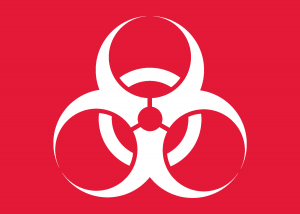The University of Toronto Biosafety Program is designed to protect lab personnel and the public from potential exposure to infectious agents, and to prevent the release of agents harmful to plants or animals. The program includes a number of components such as determining laboratory containment requirements (physical and operational controls); medical surveillance (including immunization where appropriate); classroom and online training; and compliance with regulatory requirements for importing and shipping biological agents.
Overall control of the program is through the University’s Institutional Biosafety & Biosecurity Committee with administrative and technical support provided by the Biosafety Team in the Office of Environmental Health and Safety.
SARS-CoV-2 Information
Biosafety Guideline for Research Laboratories
This biosafety guideline is intended to assist laboratories in planning and implementing their research with SARS-CoV-2 (the causative viral agent of COVID-19) or related biological materials at the University of Toronto. This guideline is based on currently available scientific evidence, the Biosafety Advisory issued by the Public Health Agency of Canada (PHAC) and is subject to review and change as new information becomes available.
SARS-CoV-2 Biosafety Guideline for U of T Labs (PDF) – Updated Aug 2022
Link to EHS SARS-CoV-2 information page
EHS 620 – SARS-CoV-2 Biosafety Training Course
A short online course has been launched to assist those working with the coronavirus, SARS-CoV-2, or related biological materials. This course outlines some of the principles and practices that need to be addressed while working with SARS-CoV-2. This course is mandatory for anyone working with SARS-CoV-2: this includes, but is not limited to, the virus itself, cDNA, RNA, fixed tissue, infected or likely infected cells or tissue.
You can find the new course on “My EHS Training” under EHS620 SARS-CoV-2 Biosafety Training Course.
Biosafety Permit Information
In order to use any biological material for research or teaching on university-controlled premises, a Biosafety Permit is required prior the use, storage, importation or transfer regardless of the risk group of a pathogen. The Biosafety Permit is focused on addressing biosafety and biosecurity risk of the biological materials involved, the nature and the location(s) of the work, the training of the personnel working with the biological materials and those who have access to these materials or to the facility. The IBC is responsible for the approval of every Biosafety Permit request.
- General information on biosafety permits
- Waste Information and Procedures (PDF)
- Risk Group Database by the Public Health Agency of Canada
- Pathogen Safety Data Sheets by the Public Health Agency of Canada
Biosafety Permit Application Package
Guide for Completing the Biosafety Permit Application (PDF)
Biosafety Permit Application Form (PDF)
Assessment for Dual-Use Subform Level 1,2 (PDF)
Memorandum of Agreement (PDF)
Biosafety Amendment Application
Amendment form to add Organism to Biosafety Permit (PDF)
Biosafety Manual
- NEW! Guideline for Biosafety Manual/Emergency Response (CL2)
- NEW! Guideline for Biosafety Manual/Emergency Response (CL1)
- NEW! Printable EHS & EPS Emergency Contact List
Biosafety Training Courses
- List of biosafety courses and registration
- Training Matrix for Lab Personnel
- Training Matrix for Administrative and Facilities Staff
- Principles & Practices of Biorisk Management
Laboratory Standards
- Canadian Biosafety Standards
- Containment Standards for Facilities Handling Plant Pests
- Containment Standards for Facilities Handling Aquatic Animal Pathogens
Lab Decommissioning
If you are vacating a lab room, you are responsible for leaving it in a state suitable for re-occupancy or renovation.
- Laboratory Decommissioning
- Decommissioning form for Biological agents (PDF)
- Safe to Remove Tag (PDF)
Importing/Shipping
** Note: All applications for import permits must be signed by the Senior Biosafety Officer before submitting to the Pathogen Regulation Directorate. If you wish to import a biological agent that is not listed on your U of T biosafety certificate, an amendment to your certificate must be approved before applying to import. **
- Importing Pathogens (human and indigenous or established animal pathogens) – Please contact the Biosafety Office
- Importing Other Pathogens (including aquatic animal pathogens)
- Importing Plant Pests
- Transportation of Dangerous Goods Regulations (Canada)
- Basic competency checklist for transporting dangerous goods
- List of vendors for type 1A and 1B containers for infectious substances
- BSO Human Pathogen and Toxin Transfer Notification (DOCX)
- Other trade/transport links
Safety Practice and Procedures
- Biosafety Manual
- Biological Spills
- SOP – Safe Autoclave Operations (PDF)
- UPDATED! Waste Information and Procedure for Bio Labs (PDF)
- Lentiviral Vectors Biosafety Guidelines from PHAC
- Vacuum Line Hazards
- Safe Work Practices for Microtome Use
- Safe Work Practices for Safe Sharps Use
- Safe Work Practices for Reducing Aerosol Risk in RG2
- NEW! Safe Work Practices for Centrifuge Use
- NEW! Biosafety Cabinet Failure/Alarm Poster
- NEW! Guideline for Biosafety Manual/Emergency Response (CL2)
- NEW! Guideline for Biosafety Manual/Emergency Response (CL1)
- NEW! Guideline for Operational Practices Level 2 Laboratory (CL2)
Images (photo, video etc.) Guidelines for Research & Teaching Laboratories
